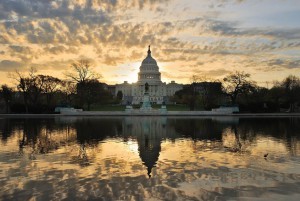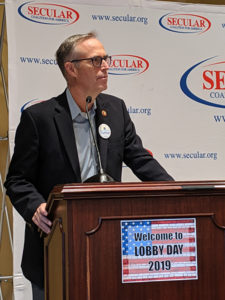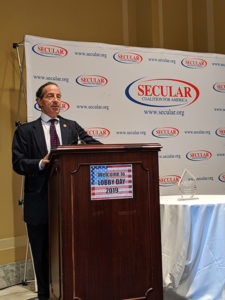On the Hill: Humanists Make Our Voice Heard

Last week, the American Humanist Association joined the Secular Coalition for America for a lobby day on Capitol Hill in Washington, DC. We were joined by nearly 100 atheists, humanists, and citizens who want to preserve the secular nature of our government to advocate on two issues to our federal elected officials: secular substance abuse recovery programs and the repeal of international blasphemy laws.
Beyond advancing a legislative agenda, lobby days also remind elected officials that the secular community is an active, engaged part of their constituencies and that we are invested in a wide range of issues.
As Sarah Levin, the director of governmental affairs at the Secular Coalition of America, explained,
This year our advocates put two issues on the radar, access to secular addiction recovery options for all Americans and a resolution calling for the global repeal of blasphemy and apostasy laws. These are issues that uniquely impact the secular community, but the solutions we are advocating for will protect people of all faiths and no faith and reinforce our movement’s inclusive vision of religious freedom.

Rep. Jared Huffman (D-CA), co-chair of the Congressional Freethought Caucus (photo via SCA)
According to the 2018 National Survey on Drug Use and Health, 19.3 million Americans over the age of eighteen had a substance abuse disorder (SUD). The impact extends beyond the nearly 8 percent of people living with a SUD, to families, friends, public health, and more. This is, without hyperbole, an epidemic that requires a proportionally vast response if we hope to stem the damage. An appropriate response will have to deal with everything from holding opioid manufacturers accountable to advancing scientific research on medication-assisted recovery.
In the middle of this national conversation are peer support groups. Support groups are places where people can share their narratives and bond with others going through or who have gone through similarly trying experiences. They are vital for keeping motivation alive in struggles that can otherwise be isolating and dark. But in many communities across the country, the only peer support groups available are faith-based and emphasize the need to surrender to a higher power and while rejecting evidence-based, medication-assisted treatment. Such strict religious approaches may dissuade nontheists from showing up or returning.
There are secular alternatives, such as SMART Recovery, Women for Sobriety, and LifeRing, that are self-empowering, mutual-support recovery programs, emphasizing personal choice and decision-making and that rely on evidence-based approaches, like cognitive behavioral therapy.
In meetings with senators and members of the House of Representatives, constituents and a few lobbyists urged members of Congress to include funding for secular recovery programs in block grants during the 2021 fiscal year.

Rep. Jamie Raskin (D-MD), co-chair of the Congressional Freethought Caucus (photo via SCA)
The second issue we raised with our elected officials was the congressional resolution on blasphemy laws around the world. As TheHumanist.com noted recently, at least seventy countries around the world still have blasphemy laws that criminalize religious dissent and the nonreligious. Our ask of Congress was simple: co-sponsor H. Res. 512 to tell the president and State Department that the repeal of blasphemy laws must be a priority in their relations with nations that have such laws.
These two issues were perfect topics for a large lobby day—they had specific asks and are bipartisan issues. Neither the current substance-abuse crisis nor international blasphemy laws are beholden to party politics. These are life-threatening issues that humanists can have an impact on in today’s legislative gridlock.
“When secular constituents have face-to-face interactions with congressional offices, it is the highest impact advocacy we can engage in,” said Levin. “The Secular Coalition for America’s annual Secular Lobby Day gives us an opportunity to show the strength of our constituency and tell the stories that don’t often get heard, directly from the source. The relationships cultivated at lobby day are built upon year-round by our professional lobbyists and member organization partners.”
Levin added that despite uphill battles they are seeing significant progress being made on these issues “in no small part thanks to the advocacy of the everyday constituents who traveled to DC last week.”
Indeed, lobby days such as the one last week are crucial components of our democratic process that the American Humanist Association will continue to champion.
